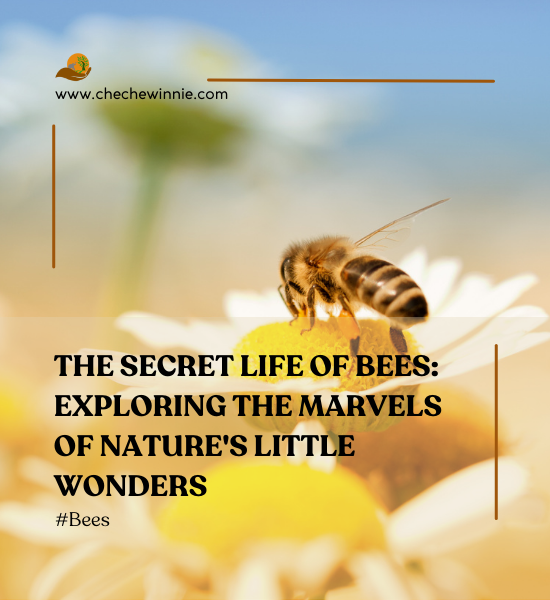Introduction:
Bees, often overlooked in the grand tapestry of nature, hold an intricate secret that is vital to the functioning of ecosystems worldwide.
In this blog, we will delve into the fascinating world of bees, uncovering their well-organized social structure, incredible pollination superpower, and challenges they face in their survival. Join us on this journey as we unravel the mysteries of these marvellous creatures and learn how we can contribute to their conservation.
The Beehive Society: A Thriving Metropolis
Bees, like humans, have a well-organized social structure within their beehives. Each member plays a unique role, collaborating harmoniously to ensure the hive’s survival.
Let’s explore the division of labour among bees, from the diligent worker bees who collect nectar and pollen, to the ever-fertile queen who lays eggs, and the valiant drones who mate with the queen. Witness their coordinated efforts and gain a deeper understanding of their intricate society.
Pollination – The Secret Superpower
Bees are nature’s superheroes when it comes to pollination, a vital process for the reproduction of flowering plants.
They embark on a remarkable journey as they gather nectar and pollen, transferring them from flower to flower. This great symbiotic relationship between bees and plants results in breathtaking landscapes and ensures the production of fruits, seeds, and new generations of plants.
Let’s delve into the intricacies of pollination and appreciate the profound impact bees have on our natural world.
The Buzz on Bee Decline and Conservation
Unfortunately, bees are facing numerous challenges that jeopardize their survival.
In recent years, there has been a growing concern about the decline of bee populations worldwide. This decline, known as bee decline or colony collapse disorder, has serious implications for ecosystems and food production.
Understanding the causes and consequences of bee decline is crucial for taking effective conservation measures.
Causes of Bee Decline:
- Habitat Loss: The destruction and fragmentation of natural habitats, such as meadows, woodlands, and wildflower-rich areas, have significantly reduced the availability of food and nesting sites for bees. Urbanization, intensive agriculture, and land-use changes have contributed to this habitat loss.
- Pesticide Exposure: Bees are exposed to various pesticides, which are commonly used in agricultural practices. Pesticides can have detrimental effects on bee health, impairing their immune systems, navigation abilities, and reproductive capabilities.
- Climate Change: Shifts in temperature, rainfall patterns, and seasonal changes due to climate change can disrupt the synchronization between bees and the flowering of plants. This can affect the availability of food sources for bees and impact their foraging behaviour.
- Diseases and Parasites: Bees face various diseases and parasites, such as Varroa mites and pathogens like Nosema, which weaken their immune systems and contribute to colony losses.
Consequences of Bee Decline:
- Reduced Pollination: Bees are essential pollinators, and their decline can lead to a decrease in pollination services. This can directly impact the reproduction and survival of many flowering plants, including agricultural crops. Without adequate pollination, crop yields can decline, affecting food production and biodiversity.
- Ecosystem Disruption: Bees play a vital role in maintaining biodiversity and ecosystem stability. The decline of bees can disrupt the intricate web of plant-pollinator interactions, leading to imbalances in ecosystems and potential cascading effects on other organisms.
Actions for Bee Conservation:
- Create Bee-Friendly Habitats: Individuals and communities can support bee conservation by providing suitable habitats. Planting native flowering plants, maintaining pesticide-free areas, and creating bee-friendly gardens or meadows can provide food and nesting sites for bees.
- Reduce Pesticide Use: Minimizing the use of pesticides can significantly reduce the exposure of bees to harmful chemicals. Integrated Pest Management (IPM) practices and organic farming methods can help protect bees while managing pests.
- Support Organic and Sustainable Agriculture: Choosing organic produce and supporting sustainable farming practices reduces the use of synthetic pesticides and promotes healthier ecosystems for bees and other pollinators.
- Educate and Raise Awareness: Spreading awareness about the importance of bees and their conservation is crucial. Educate others about the role of bees in pollination, the challenges they face, and the actions that individuals and communities can take to support bee conservation.
- Engage in Citizen Science: Participating in citizen science initiatives, such as bee monitoring programs or pollinator surveys, can contribute valuable data for research and conservation efforts.
Bee decline is a pressing issue that requires collective action. By addressing the causes of bee decline, promoting bee-friendly practices, and raising awareness, individuals and communities can make a significant difference in ensuring a brighter future for these essential pollinators.
Together, we can protect bees, preserve biodiversity, and safeguard the intricate marvels of nature’s little wonders.
Conclusion:
Let us remember the crucial role bees play in maintaining the delicate balance of our ecosystems and embark on a mission to protect and preserve these remarkable creatures. By understanding their society, appreciating their superpower of pollination, and actively engaging in conservation efforts, we can create a world where bees thrive, and nature’s symphony continues to flourish. Join us in this collective endeavour to safeguard the secret life of bees and unlock the marvels of nature’s little wonders.

